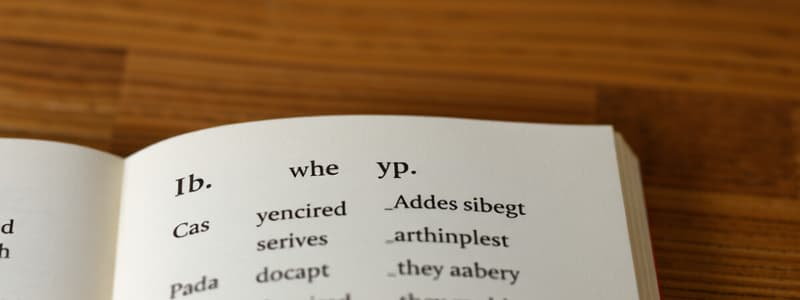Podcast
Questions and Answers
In which context should 'do' be appropriately used?
In which context should 'do' be appropriately used?
- To form present perfect sentences
- To express actions currently taking place
- To indicate passive voice constructions
- To create negative statements and questions (correct)
Which of the following sentences correctly uses 'have' in a present perfect context?
Which of the following sentences correctly uses 'have' in a present perfect context?
- She is not created her own website.
- He had wrote the report last week.
- They have finished their homework. (correct)
- I do seen that movie already.
When forming a question using 'be', which of the following is correct?
When forming a question using 'be', which of the following is correct?
- Has he being late?
- Did they is coming later?
- Is she going to the store? (correct)
- Are you wrote the article?
Which sentence depicts a correct usage of 'be' in a passive structure?
Which sentence depicts a correct usage of 'be' in a passive structure?
Identify the incorrect auxiliary verb usage among the following options.
Identify the incorrect auxiliary verb usage among the following options.
Flashcards
What are Auxiliary Verbs?
What are Auxiliary Verbs?
Auxiliary verbs work together with main verbs to create a complete verb phrase. They help convey information about tense, mood, and voice.
Use of 'do' Auxiliary Verb
Use of 'do' Auxiliary Verb
Used for forming negative statements and questions, as well as short answers in the simple present and simple past tenses.
Use of 'have' Auxiliary Verb
Use of 'have' Auxiliary Verb
Used for forming perfect tenses (present perfect and past perfect), including affirmative, negative, questions, and short answers.
Use of 'be' Auxiliary Verb
Use of 'be' Auxiliary Verb
Signup and view all the flashcards
Use of 'be' Auxiliary Verb for Passive Voice
Use of 'be' Auxiliary Verb for Passive Voice
Signup and view all the flashcards
Study Notes
Auxiliary Verbs
- Auxiliary verbs assist main verbs. Common auxiliaries are "do," "have," and "be."
"Do"
- Used in negative statements and questions.
- Used with affirmative and negative short answers.
- Example: "She doesn’t like social networking websites."
- Example: "Do you send lots of text messages? Yes, I do. / No, I don’t."
- Example: "Did Thomas answer your email? Yes, he did. / No, he didn’t."
"Have"
- Used with present perfect and past perfect tenses.
- Used in affirmative and negative statements, questions, and short answers.
- Example: "She has (not) created her own website."
- Example: "Has she posted any photos yet? Yes, she has. / No, she hasn’t."
- Example: "Have you charged your cell phone? Yes, I have. / No, I haven’t."
- Example: "I had gotten his email an hour before he called me."
"Be"
-
Used with progressive tenses (showing actions in progress).
-
Used in affirmative and negative statements, questions, and short answers.
-
Example: "She is (not) answering her cell phone."
-
Example: "Is your cell phone working? Yes, it is. / No, it isn’t."
-
Example: "He was using his brother’s cell phone yesterday."
-
Example: "Were you surfing the Internet last night? Yes, I was. / No, I wasn’t."
-
Also used with passive voice.
-
Used in affirmative and negative statements, questions, and short answers.
-
Example: "The Internet is (not) used by millions of people."
-
Example: "Were you given a password? Yes, I was. / No, I wasn’t."
Studying That Suits You
Use AI to generate personalized quizzes and flashcards to suit your learning preferences.




